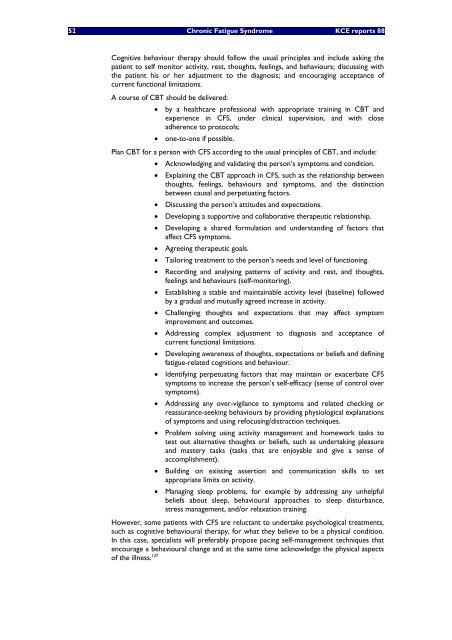Chronisch Vermoeidheidssyndroom: diagnose, behandeling en ...
Chronisch Vermoeidheidssyndroom: diagnose, behandeling en ...
Chronisch Vermoeidheidssyndroom: diagnose, behandeling en ...
You also want an ePaper? Increase the reach of your titles
YUMPU automatically turns print PDFs into web optimized ePapers that Google loves.
52 Chronic Fatigue Syndrome KCE reports 88<br />
Cognitive behaviour therapy should follow the usual principles and include asking the<br />
pati<strong>en</strong>t to self monitor activity, rest, thoughts, feelings, and behaviours; discussing with<br />
the pati<strong>en</strong>t his or her adjustm<strong>en</strong>t to the diagnosis; and <strong>en</strong>couraging acceptance of<br />
curr<strong>en</strong>t functional limitations.<br />
A course of CBT should be delivered:<br />
• by a healthcare professional with appropriate training in CBT and<br />
experi<strong>en</strong>ce in CFS, under clinical supervision, and with close<br />
adher<strong>en</strong>ce to protocols;<br />
• one-to-one if possible.<br />
Plan CBT for a person with CFS according to the usual principles of CBT, and include:<br />
• Acknowledging and validating the person’s symptoms and condition.<br />
• Explaining the CBT approach in CFS, such as the relationship betwe<strong>en</strong><br />
thoughts, feelings, behaviours and symptoms, and the distinction<br />
betwe<strong>en</strong> causal and perpetuating factors.<br />
• Discussing the person’s attitudes and expectations.<br />
• Developing a supportive and collaborative therapeutic relationship.<br />
• Developing a shared formulation and understanding of factors that<br />
affect CFS symptoms.<br />
• Agreeing therapeutic goals.<br />
• Tailoring treatm<strong>en</strong>t to the person’s needs and level of functioning.<br />
• Recording and analysing patterns of activity and rest, and thoughts,<br />
feelings and behaviours (self-monitoring).<br />
• Establishing a stable and maintainable activity level (baseline) followed<br />
by a gradual and mutually agreed increase in activity.<br />
• Chall<strong>en</strong>ging thoughts and expectations that may affect symptom<br />
improvem<strong>en</strong>t and outcomes.<br />
• Addressing complex adjustm<strong>en</strong>t to diagnosis and acceptance of<br />
curr<strong>en</strong>t functional limitations.<br />
• Developing awar<strong>en</strong>ess of thoughts, expectations or beliefs and defining<br />
fatigue-related cognitions and behaviour.<br />
• Id<strong>en</strong>tifying perpetuating factors that may maintain or exacerbate CFS<br />
symptoms to increase the person’s self-efficacy (s<strong>en</strong>se of control over<br />
symptoms).<br />
• Addressing any over-vigilance to symptoms and related checking or<br />
reassurance-seeking behaviours by providing physiological explanations<br />
of symptoms and using refocusing/distraction techniques.<br />
• Problem solving using activity managem<strong>en</strong>t and homework tasks to<br />
test out alternative thoughts or beliefs, such as undertaking pleasure<br />
and mastery tasks (tasks that are <strong>en</strong>joyable and give a s<strong>en</strong>se of<br />
accomplishm<strong>en</strong>t).<br />
• Building on existing assertion and communication skills to set<br />
appropriate limits on activity.<br />
• Managing sleep problems, for example by addressing any unhelpful<br />
beliefs about sleep, behavioural approaches to sleep disturbance,<br />
stress managem<strong>en</strong>t, and/or relaxation training.<br />
However, some pati<strong>en</strong>ts with CFS are reluctant to undertake psychological treatm<strong>en</strong>ts,<br />
such as cognitive behavioural therapy, for what they believe to be a physical condition.<br />
In this case, specialists will preferably propose pacing self-managem<strong>en</strong>t techniques that<br />
<strong>en</strong>courage a behavioural change and at the same time acknowledge the physical aspects<br />
of the illness. 137

















